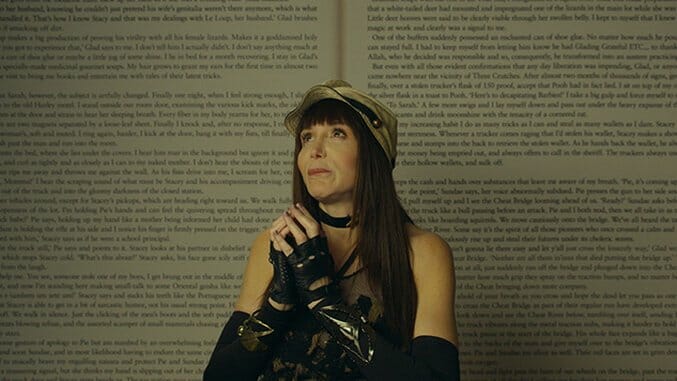Author: The JT Leroy Story

In a movie that perpetually keeps us questioning our preconceived notions and conclusions—whatever they may be—only one thing about Author: The JT Leroy Story is certain: It has a hell of a story to tell. Laura Albert’s head-spinning chronicle of the deception she perpetrated on the public as literary wunderkind JT Leroy in the 1990s and 2000s is so inherently compelling that the film would probably still have had an impact if director Jeff Feuerzeig had done nothing more than just turned on a camera and let Albert do all the talking. This is something she had yet to do publicly beforehand, at least to this degree of detail: How could Albert possibly explain away the many alter egos she created in the midst of such an elaborate ruse without coming across as a head case?
Feuerzeig’s film, however, aims to be more than just a standard talking-heads doc. As was the case for singer/songwriter Daniel Johnston in his last feature The Devil and Daniel Johnston (2005), Feuerzeig tries to get inside his subject’s head through cinematic means. Some of his attempts at inhabiting Albert’s headspace are rather annoyingly literal-minded: black-and-white clips of Tarzan when Albert makes a comparison to the famous character; images of fax machines and telephones when Albert indicates that a story has been faxed and a phone call has been made; handwritten text that unnecessarily writes out on-screen certain passages from Albert’s stories which Albert herself also reads aloud.
Other such bits of technique, though, have a certain expressive logic to them. Perhaps most noteworthy are the animated sequences, courtesy of Joshua Mulligan and Stefan Nadelman, that bring portions of Albert’s stories to life. Often using black line drawings on a ruled-notebook-paper backdrop, the animation infuses the passages with a fanciful quality wholly appropriate to what are essentially fictional creations—albeit fictions that, Albert is quick to make clear throughout the film, are based on her own painful life experiences.
-

-

-

-

-

-

-

-

-

-

-

-

-

-

-

-

-

-

-

-

-

-

-

-

-

-

-

-

-

-

-

-

-

-

-

-

-

-

-

-








































